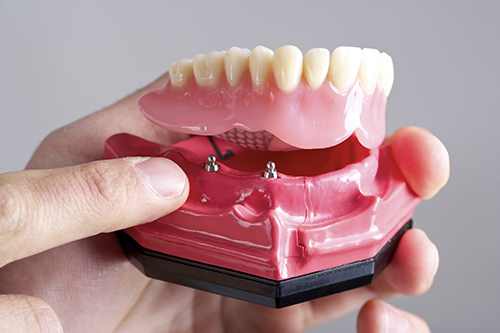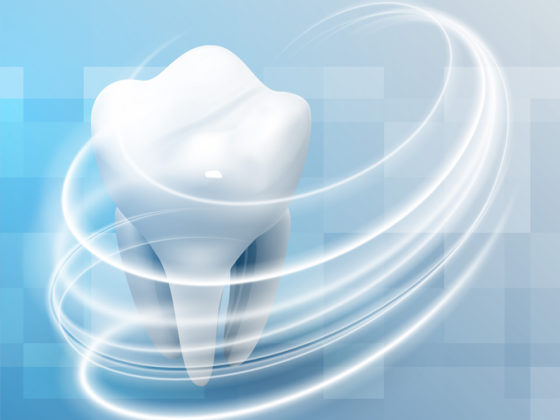IMPLANT-SUPPORTED DENTURES VS TRADITIONAL CONVENTIONAL DENTURES: WHICH IS RIGHT FOR YOU?
Keywords: denture, missing teeth, best option for missing teeth, loose dentures, best replacement for missing tooth, dental implant, implant crown, implant bridge, implant denture, implant tooth, implant-supported dentures, implant-retained dentures
Both types of dentures can provide great cosmetic and functional results, but the advent of implant dentistry has revolutionized the world of dentures. The stability and strength that comes with implant-retained dentures have been a game-changer in the dental field, improving not only the functional aspect of dentures for patients but also comfort and lifestyle.
The first step in determining candidacy for implant-retained dentures is to determine the density and volume of the jawbone, and whether the patient is suited for implant-supported or retained dentures. If the volume and density of the jawbone are insufficient to support a full complement of dental implants, you may not be able to get an implant-supported or retained denture. Other key factors that will influence a patient’s choice of treatment and their clinician’s recommendation include health, lifestyle, and diet.
HEALTH
If you suffer from conditions such as TMJ disorder (TMD) or sleep apnea, permanently affixed implant-supported dentures are much more beneficial than traditional conventional dentures. They will provide the strength and stability needed to help with such conditions.
LIFESTYLE
If you don’t like the thought of having removable dentures or want to make sure your teeth are always in place when you eat or speak, then implant-supported dentures are the ultimate choice.
DIET
If you are a big fan of some hard-to-chew foods like steak, bagels, or apples, the difference between traditional conventional dentures and implant-supported dentures is truly night and day!

Implant-Retained Dentures Kanata
Frequently Asked Questions About Implant Supported Dentures
Carleton Place implant retained dentures Kanata
Will this procedure work if I have worn dentures for a long time?
- Yes, if you have worn dentures for years, you can upgrade your prosthetic This is an ideal way to do so because it gives you some of the stability you can expect from dental implants without the need for a longer process involving the fabrication of a whole new denture. Your existing denture can be retrofitted with parts that click onto the heads of the new implants in your mouth.
Does this procedure hurt?
- No, when you visit our office, we will provide you with all the necessary anesthetic and sedation for a truly pain-free experience. At Marchwood Dental, we understand that dental procedures can be intimidating and anxiety-filled, and we will take all steps needed to ensure that you remain comfortable and relaxed during the entirety of the appointment. Almost all our patients that undergo surgery for traditional dental implants are pleasantly surprised by the pain-free nature of the procedure itself, as well as the post-op healing period.
What are mini-implants?
- Some people will speak of “mini-implants” when considering implant-supported dentures. A mini-implant is a titanium screw much like a traditional implant. The difference is that it is much smaller. This makes it ideal for those suffering from a lack of bone density and thickness. Traditional implants require significant density since the implant itself is longer and wider in diameter. This is not the case with mini-implants, making them a better solution for someone who has worn dentures for years and has experienced bone resorption as a result.
What is the recovery time?
Within days of undergoing a procedure for implant-supported dentures, you will start to feel like your normal self. You should be careful to avoid eating anything hard or difficult to chew, like a steak, along with anything sharp, like chips or crackers. Such foods can cause further irritation and only serve to prolong your recovery time. Instead, focus on eating soft foods that are easy to chew and can be chewed quickly. Things like oatmeal, steamed vegetables, fish, yogurt, and soup are just some of the many favorable options. If you watch what you eat, take it easy, ice the area, and use painkillers such as ibuprofen or acetaminophen, you should feel better within a couple of days. This is a much less invasive procedure than most people anticipate. The recovery time is much faster than people think!
In our next article following this series, we will cover situations when an implant is recommended, and what to expect from the procedure. See you at the next article!
Marchwood Dental Clinic specializes in dental implants crown and aesthetic treatments, focusing on the oral and dental health of patients in Kanata, Dunrobin, Carleton Place, Almonte, Carp and all of West Ottawa. We offer many treatment options and alternatives with cutting-edge technology to guarantee the quality of our service.
Contact us and schedule your appointment at Marchwood Dental Clinic serving Kanata, Dunrobin, Carleton Place, Almonte, Carp and all of West Ottawa today. Follow us on Facebook and Instagram for more information.
Book a
complimentary
dental implant
assessment
Receive the gift of a WaterPik flosser or an Opalescence whitening kit when you start your treatment within a month of your assessment.


